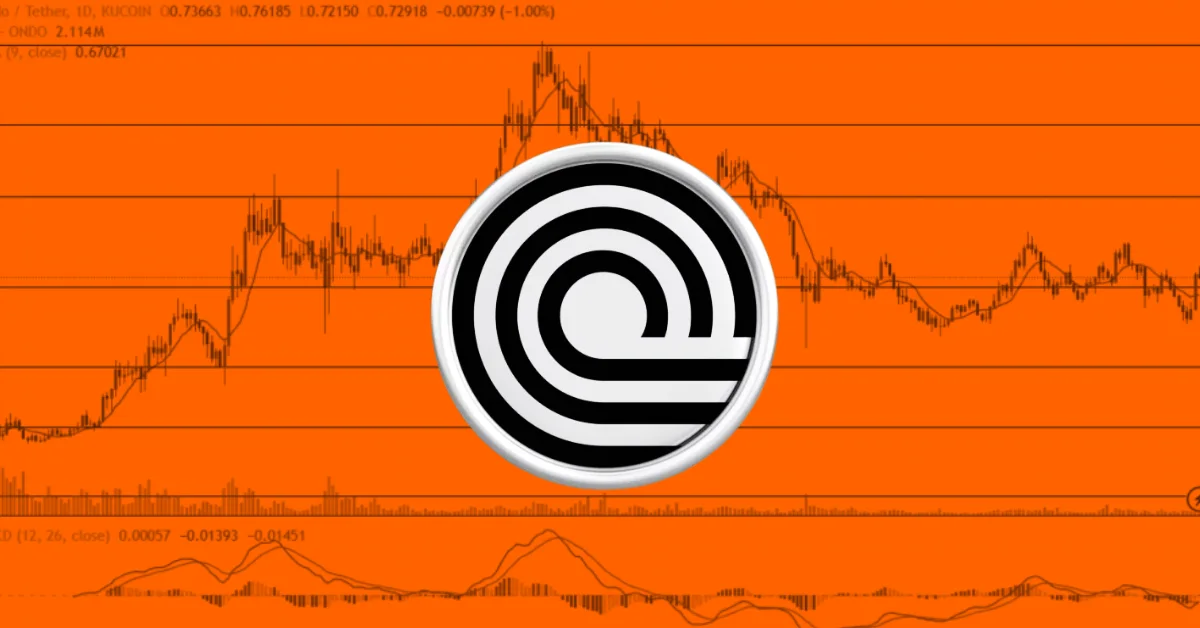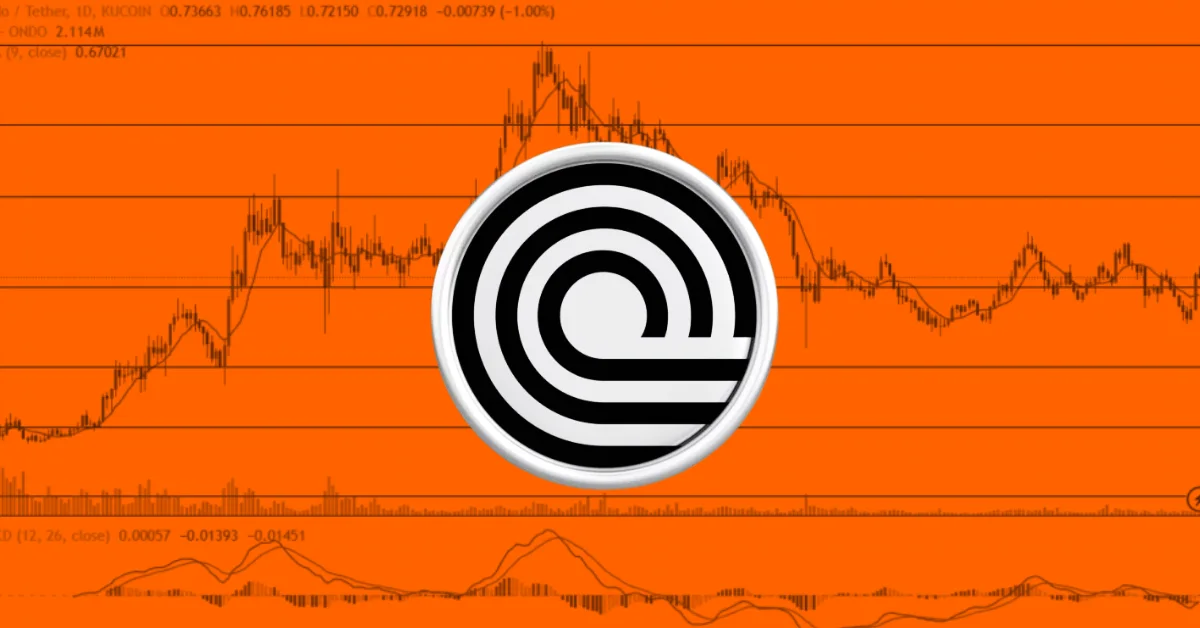The Convergence of TradFi and DeFi: Analyzing 21Shares’ Spot ONDO ETF Filing
Introduction: A New Era of Financial Innovation
The financial landscape is undergoing a profound transformation, driven by the convergence of traditional finance (TradFi) and decentralized finance (DeFi). At the heart of this evolution is the tokenization of real-world assets (RWAs), a trend that is reshaping how investors access and interact with financial instruments. The recent filing by 21Shares with the U.S. Securities and Exchange Commission (SEC) for a spot ONDO exchange-traded fund (ETF) is a testament to this shift. This move not only highlights the growing institutional interest in tokenized assets but also positions Ondo Finance as a key player in this burgeoning sector. This report explores the intricacies of the ETF filing, its potential market impact, and the broader implications for the future of finance.
The Rise of Real-World Asset Tokenization
The tokenization of real-world assets has emerged as a disruptive force in the cryptocurrency space, with the total on-chain value now exceeding $25 billion. This process involves representing ownership of tangible assets, such as real estate, commodities, and fixed-income securities, as digital tokens on a blockchain. The benefits of tokenization are multifaceted, offering a range of advantages that traditional financial instruments struggle to match.
Increased Liquidity and Accessibility
One of the most significant advantages of tokenization is the increased liquidity it provides. Tokenized assets can be traded more easily and efficiently than their traditional counterparts, unlocking liquidity and potentially attracting a wider range of investors. This is particularly beneficial for assets that are typically illiquid, such as real estate or private equity. By tokenizing these assets, investors can gain exposure to high-value investments without the need for large capital outlays.
Fractional Ownership and Democratization
Tokenization also enables fractional ownership, allowing investors to purchase a fraction of an asset rather than the entire asset itself. This democratizes access to high-value investments, making them accessible to smaller investors who may not have the financial means to invest in traditional markets. For example, an investor can purchase a fraction of a commercial property or a bond, gaining exposure to the asset’s performance without the need for a substantial investment.
Enhanced Transparency and Security
Blockchain technology provides a transparent and immutable record of ownership and transactions, reducing the risk of fraud and increasing trust. This transparency is particularly valuable in the context of real-world assets, where ownership and transaction histories can be complex and opaque. By tokenizing assets, investors can gain a clear and verifiable record of ownership, enhancing the security and integrity of the investment.
Improved Efficiency and Cost Savings
Tokenization can streamline administrative processes, reduce transaction costs, and accelerate settlement times. Traditional financial transactions often involve intermediaries, such as banks or brokers, which can add complexity and cost to the process. By tokenizing assets, investors can bypass these intermediaries, reducing costs and increasing efficiency. Additionally, blockchain technology enables near-instant settlement, eliminating the need for lengthy clearing and settlement processes.
21Shares’ ONDO ETF: Bridging the Gap Between DeFi and TradFi
21Shares, a well-established issuer of crypto exchange-traded products (ETPs) and ETFs, has a proven track record of providing investors with regulated and transparent access to the digital asset market. The proposed “21Shares Ondo Trust” aims to track the performance of the ONDO token, the native token of Ondo Finance. This ETF will hold ONDO tokens directly and follow the CME CF Ondo Finance-Dollar Reference Rate, offering investors a regulated and familiar investment vehicle to gain exposure to tokenized fixed-income securities.
Simplifying Access to DeFi
The ONDO ETF is designed to simplify the process for investors to gain exposure to tokenized fixed-income securities without directly interacting with the complexities of the DeFi ecosystem. This is particularly important for institutional investors, who may be hesitant to invest directly in cryptocurrencies due to regulatory concerns or a lack of familiarity with DeFi protocols. By offering a spot ETF, 21Shares is providing a bridge between TradFi and DeFi, enabling investors to access the benefits of tokenization while maintaining the regulatory protections and familiarity of traditional investment vehicles.
The Role of Ondo Finance
Ondo Finance is a decentralized finance (DeFi) platform focused on tokenizing real-world assets, particularly fixed-income securities. The platform aims to connect institutional investors with DeFi opportunities, offering a suite of products and services that facilitate the creation, management, and trading of tokenized assets. Ondo Finance has been strategically positioning itself as a leader in the RWA space through several key initiatives, including the acquisition of a broker-dealer, which enhances its ability to offer on-chain securities and streamline regulatory compliance.
The ONDO Token and Its Utility
The ONDO token plays a crucial role in the Ondo Finance ecosystem, serving as a governance token and potentially offering utility within the platform’s various products and services. The ETF will be 100% physically backed by ONDO, providing investors with a regulated and transparent way to access tokenized fixed-income securities. This ETP offers investors a unique opportunity to gain exposure to the growing DeFi market while supporting the evolution of on-chain traditional markets.
Market Impact and Potential Price Surge
The announcement of the 21Shares ONDO ETF filing has already had a positive impact on the price of the ONDO token. Following the announcement, the price of ONDO jumped 2.3%, and the market cap hit $3.44 billion. Analysts predict a potential 2-3x surge in ONDO, driven by several factors.
Increased Demand and Institutional Adoption
The ETF is expected to drive increased demand for ONDO tokens as investors seek exposure to the underlying asset. This increased demand could lead to a surge in the token’s price, particularly if the ETF attracts significant institutional investment. Additionally, the availability of an ETF could attract institutional investors who have previously been hesitant to invest directly in cryptocurrencies due to regulatory concerns or a lack of familiarity with DeFi protocols.
Market Validation and Liquidity
The SEC filing validates the growing interest in tokenized real-world assets and the potential of Ondo Finance as a key player in this space. This validation could further boost investor confidence and drive demand for ONDO tokens. Additionally, the listing of ONDO on major exchanges, such as Binance US, further amplifies this effect, increasing accessibility and liquidity for the token. For example, ONDO soared from the daily low of $1.0583 to $1.1642, a 10% increase, following its listing on Binance US.
Regulatory Considerations and Challenges
The SEC’s approval of the 21Shares ONDO ETF is not guaranteed, as the agency has been cautious in its approach to crypto-related investment products. Several regulatory considerations and challenges could impact the approval process.
Custody and Security
The SEC will likely scrutinize the custody arrangements for the ONDO tokens, ensuring that they are stored securely and protected from theft or loss. Coinbase Custody will safeguard all ONDO tokens for the proposed ETF, providing a robust and secure custody solution. However, the SEC may still have concerns about the security of digital assets and the potential for hacking or other security breaches.
Market Manipulation and Investor Protection
The SEC will also assess the potential for market manipulation in the ONDO market and whether adequate safeguards are in place to prevent such activity. This is a particular concern in the context of cryptocurrencies, which have been subject to significant price volatility and manipulation in the past. The SEC will want to ensure that investors are protected from market manipulation and that the ETF is not being used as a vehicle for speculative trading.
Regulatory Clarity and Uncertainty
The lack of clear regulatory guidance for digital assets in the United States could create uncertainty and potentially delay the approval process. The SEC has been slow to provide clear guidance on the regulation of cryptocurrencies and digital assets, leading to a lack of clarity for issuers and investors alike. This uncertainty could pose a challenge for the approval of the ONDO ETF, as the SEC may be hesitant to approve a product that falls outside of its current regulatory framework.
The Future of Finance: Tokenization as a Catalyst
The 21Shares ONDO ETF filing represents a significant step towards the mainstream adoption of tokenized real-world assets. As the DeFi ecosystem continues to mature and regulatory clarity improves, we can expect to see more traditional financial institutions embracing tokenization as a way to enhance efficiency, increase liquidity, and expand access to investment opportunities.
Bridging the Gap Between TradFi and DeFi
The successful launch of an ONDO ETF could pave the way for similar products that track other tokenized assets, further bridging the gap between DeFi and TradFi. This convergence has the potential to revolutionize the financial industry, creating a more inclusive, transparent, and efficient global financial system. By integrating the benefits of blockchain technology with the regulatory protections and familiarity of traditional investment vehicles, tokenization can offer investors the best of both worlds.
Expanding Access to Investment Opportunities
Tokenization can also expand access to investment opportunities, particularly for smaller investors who may not have the financial means to invest in traditional markets. By enabling fractional ownership and reducing transaction costs, tokenization can democratize access to high-value investments, creating a more level playing field for investors of all sizes.
Enhancing Efficiency and Transparency
Tokenization can enhance the efficiency and transparency of financial markets, reducing the need for intermediaries and streamlining administrative processes. By providing a transparent and immutable record of ownership and transactions, tokenization can increase trust and reduce the risk of fraud, creating a more secure and efficient financial system.
A Tokenized Future Beckons
The 21Shares filing for a spot ONDO ETF is not just about a single ETF; it’s a beacon signaling the future of finance. It’s a bold step towards integrating real-world assets into the digital realm, promising increased liquidity, fractional ownership, and enhanced transparency. While regulatory hurdles remain, the momentum behind tokenization is undeniable. This ETF, if approved, could be a watershed moment, ushering in an era where traditional and decentralized finance converge, creating a more accessible and efficient financial landscape for everyone.
As the financial industry continues to evolve, tokenization is poised to play a central role in shaping the future of finance. By bridging the gap between TradFi and DeFi, tokenization can offer investors a unique opportunity to gain exposure to the benefits of blockchain technology while maintaining the regulatory protections and familiarity of traditional investment vehicles. The 21Shares ONDO ETF filing is a testament to this potential, and its approval could mark a significant milestone in the evolution of finance.












